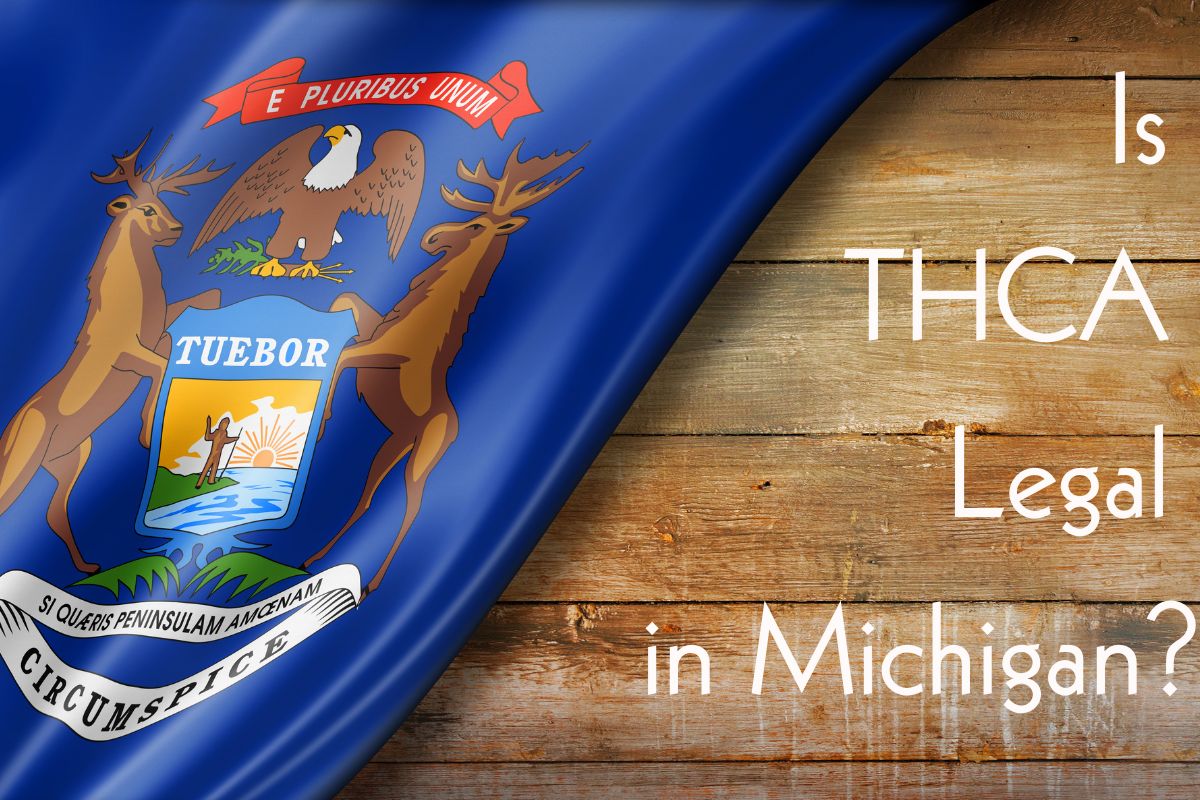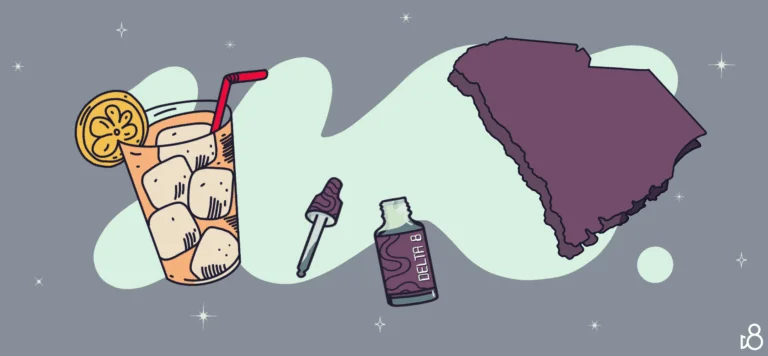Is THCa Legal in Michigan: Understanding State Cannabis Laws
Jump into the world of Michigan’s weed laws and get ready for a fascinating ride with THCa, also known as tetrahydrocannabinolic acid. Imagine THCa as the quiet before the fun kicks in: it’s the laid-back relative of THC, the star of the show in cannabis. Ignite it, and presto, THCa transforms into THC, sparking that beloved high. Lucky for fans, Michigan goes big on cannabis for enjoyment and health, yet there’s a long list of do’s and don’ts with THCa and its kin. If surfing these herbal waves seems exciting, hang with us. You’re about to discover some cool tips and must-know facts that’ll have you strutting like an expert. Keep your eyes peeled as we uncover these mysteries together. Believe me, this is something you’ll want to stick around for!
In Michigan, the possession, sale, and use of regulated cannabis products, including those containing THCa, are permitted under the stipulated guidelines. However, the potency levels of these products are subject to state regulatory oversight. It’s essential to differentiate between regulated cannabis products, which may contain THCa within legal thresholds, and hemp-derived products, where the allowable THC levels – and by extension, THCa levels – must not exceed 0.3% to be considered legal under federal law, as per the U.S. Farm Bill. The regulation of cannabinoid levels, including THCa, ensures that consumers have access to safe products and that law enforcement can differentiate between legal and illegal substances.
You should be aware that the legal status of cannabis and its compounds can have nuances depending on the context of their use and the form in which they are available. Compliance with Michigan’s cannabis regulations, including those concerning THCa, requires an understanding of the evolving legal definitions and standards for cannabis-related substances. It’s advised to keep abreast of current cannabinoid regulations to navigate this space lawfully and responsibly.
Legality of THCa in Michigan
In Michigan, the legal status of THCa—a non-psychoactive precursor to THC in cannabis plants—ties closely with both federal and state cannabis laws. Understanding its legality involves dissecting these overlapping regulations.
Federal and State Legislation Overviews
Federal law, particularly the 2018 Farm Bill, redefined hemp as cannabis with a THC content of 0.3% or less on a dry weight basis and removed it from the list of scheduled substances. As a result, cannabinoids derived from hemp, which would include THCa, fall within legal parameters federally, provided they do not surpass the THC threshold.
Michigan Cannabis Laws
Michigan law aligns with federal legislation through the Michigan Regulation and Taxation of Marihuana Act. This state act legalized cannabis for recreational use and permits adults 21 and over in Michigan to possess marijuana, which includes various cannabinoids. However, the law makes a distinction between legal consumer possession and illegal, unregulated production.
THCa and Controlled Substances
THCa itself is not psychoactive but can convert into THC upon decarboxylation, which may occur through heat or time. Because of its potential to convert to THC, THCa’s legality hinges on whether it originates from legally-grown hemp or marijuana. If a THCa product exceeds the federal 0.3% THC limit, it may be considered a controlled substance under both federal and Michigan law.
Law Enforcement and THCa
For law enforcement in Michigan, distinguishing between legal and illicit THCa products can pose a challenge. Analytical techniques, like chromatography, are important in determining the source of THCa and its legality for possession and use. Knowing whether your THCa products are compliant with state and federal regulations is crucial to avoid legal complications.

Understanding THCa
Before diving into the specifics, you should know that THCA stands for tetrahydrocannabinolic acid, a non-psychoactive cannabinoid found in the raw cannabis plant. Its relationship with THC, medical applications, and legal status are key points to consider when examining its presence in the Michigan cannabis market.
THCa vs. THC
THCa is the acidic precursor to delta-9-tetrahydrocannabinol (THC), the compound known for its psychoactive effects. THCa itself is non-intoxicating; it requires heat through a process called decarboxylation to convert into psychoactive THC. When cannabis is heated, as in smoking or vaporizing, THCa loses a carbon atom and transforms into THC.
Medical and Recreational Uses
The medical benefits of THCa are under research, with some studies suggesting potential anti-inflammatory and neuroprotective properties. While THCa is not intoxicating, its conversion to THC means that it can be used both medically and recreationally once decarboxylated. For medical use, regulated products containing THC can be accessed by patients with qualifying conditions.
Hemp-Derived Products and Legal Status
Under the Michigan Regulation and Taxation of Marihuana Act, the use of marijuana and its derivatives, including hemp-derived products, for recreational purposes is legal. However, the legal status of cannabinoids can vary. Hemp-derived products like CBD are legal if they contain less than 0.3% THC content. The legal landscape is continually adapting, so it’s imperative to stay informed on the current regulations regarding THCa and other cannabis-derived substances.

Commercial and Personal Handling of THCa
Understanding the legal landscape for THCa in Michigan is essential for both businesses and consumers. Here, we explore how it applies to cultivation, sales, and personal use.
Cultivation and Production of Hemp
In Michigan, hemp cultivation is regulated and permitted under specific guidelines. If you’re looking to grow hemp, including hemp flower that could contain THCa, it’s critical to comply with the state’s regulation. Hemp should contain no more than 0.3% THC to remain legally defined as hemp, as opposed to marijuana, which is under stricter control.
Businesses and Sales of THCa Products
For businesses, selling THCa products like gummies or oils derived from legal hemp is permissible as long as the overall THC content remains below 0.3%. The sale of these THC products is overseen by authorities to ensure they don’t venture into the realm of illegal marijuana products. As a business, you need to ensure strict testing and compliance to maintain legality.
Consumer Possession and Use
As a consumer in Michigan, you are allowed to possess and use THCa derivatives, including those designed for smoking, vaping, cooking, or as gummies. Remember, these products should originate from legal hemp and not exceed the THC threshold. Possession limits apply, so it’s advisable to stay informed about the quantity you’re legally permitted to have.

Jurisdictions and Comparative Legality
When exploring the legality of THCa in Michigan, it’s essential to understand how it compares to other states, as well as federal and international stances. Regulations can vary widely, adding complexity to the legal landscape for constituents and businesses alike.
THCa Legal Status in Other States
In the United States, THCa’s legal status varies by state. For instance, while Michigan has passed HB 5085, which affects the way veterinarians can discuss cannabis, it does not directly address the legal status of THCa. California and Colorado have established legal cannabis markets that include THCa, whereas states like Idaho and Kansas maintain stringent prohibitions against THCa along with other cannabis derivatives. Texas, on the other hand, presents a nuanced case as the legality of Delta-8 THC, a close relative of THCa, is currently in dispute.
Federal vs. State Regulations
The legal landscape for THCa is influenced by a complex interplay between federal and state regulations. Federally, the Controlled Substances Act does not explicitly list THCa as illegal, but since THCa can be considered an analog of THC, it could be treated as a Schedule I substance under the Federal Analogue Act. Yet, many states have taken their own approach: Alaska, Arizona, California, and Colorado fully legalize cannabis and its derivatives, whereas others only allow them for medical use or remain completely prohibitive. Keep in mind that despite state laws permitting cannabis, federal law still prevails and can result in legal discrepancies.
International THCa Regulations
Internationally, THCa regulations can diverge significantly. Countries like Canada and Uruguay have legalized cannabis nationally, which includes THCa. Some European countries maintain a distinction between recreational and medicinal cannabis, potentially affecting the legality of THCa. It’s vital to consult local laws if considering THCa-related activities outside of the United States, as international laws can be markedly different and carry serious consequences for non-compliance.

Future of THCa Legislation
When considering the future of THCa legislation in Michigan, it’s important you understand both the current legal framework and the possible directions it may take.
THCa, or Tetrahydrocannabinolic acid, is a non-psychoactive cannabinoid found in raw and live cannabis. As the legal landscape for cannabis and its derivatives evolves, THCa’s legal status may also change, reflecting new understandings of its potential benefits and usage.
- Current legal framework
In the past, legislation such as the 2018 Farm Bill primarily focused on THC, the psychoactive component of cannabis, and did not address THCa specifically. - Present and future legislation
Michigan’s stance on cannabis is progressive, having legalized it for both medical and recreational use. This acceptance indicates a potential pathway for the legal development around cannabinoids like THCa. Future regulations might include:- Standards for THCa content and labeling
- Research allowances to explore therapeutic benefits
- Adjustments complying with federal standards
Your awareness of this landscape will be crucial as state-specific regulations can and often do evolve independently, aligning occasionally with or diverging from federal policies.
To remain informed on THCa’s legal status in Michigan, you may consider monitoring legislative bills and amendments related to hemp and cannabis products. With a dynamic industry, your understanding allows you to anticipate changes that could impact usage, commerce, and legal compliance around THCa.
Frequently Asked Questions
In this section, you’ll find concise and specific answers to common questions regarding the legal status of THCa in Michigan, covering various aspects such as shipping, recent legal changes, and comparisons to other states.
What are the legalities of shipping THCa products?
Currently, shipping THCa products within Michigan is subject to state regulations on medical and recreational cannabis. You must comply with state laws, and it is crucial to ensure that shippers and recipients abide by Michigan’s cannabis legislation.
Has the legal status of THCa in Michigan changed recently?
Michigan’s marijuana laws have evolved over time, but as of my knowledge cutoff, both recreational and medicinal use of cannabis is legal. This includes THCa, as it is a non-intoxicating precursor found in the raw cannabis plant. Always verify with the most current state legislation for the latest updates.
Are there any restrictions on purchasing THCa in Michigan?
THCa purchases in Michigan are regulated. You may need to show proof of age or medical authorization depending on whether you’re part of the recreational or medical marijuana program.
How does THCa legality in Michigan compare to other states like Florida, Indiana, or Iowa?
Michigan is among the states where both medical and recreational cannabis are legal, including THCa. In contrast, Florida has legalized medical cannabis, Indiana has not legalized cannabis except for limited CBD use, and Iowa only permits CBD products with less than 0.3% Delta-9-THC.
Can the consumption of THCa result in intoxication?
Consumption of THCa in its natural form does not cause intoxication. THCa must be converted to Delta-9-THC, the psychoactive compound in cannabis, to produce intoxicating effects.
Is there a process through which THCa converts into Delta-9-THC?
Yes, through a process called decarboxylation, THCa is converted into Delta-9-THC. This occurs when cannabis is heated at a certain temperature, such as during smoking, vaping, or cooking.










